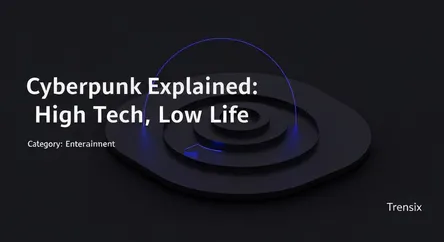Entertainment
Cyberpunk Explained: High Tech, Low Life

Explore Cyberpunk, the sci-fi subgenre known for its high-tech, low-life settings, dystopian societies, and focus on transhumanism and rebellion.
What is it?
Cyberpunk is a subgenre of science fiction set in a futuristic, dystopian society characterized by the motto "high tech, low life." These worlds feature advanced technology, such as artificial intelligence and cybernetics, juxtaposed with societal decay, corporate control, and urban squalor. Protagonists are often anti-heroes—hackers, rebels, or marginalized individuals—fighting against oppressive corporations or totalitarian governments. Foundational movies in the genre include Ridley Scott's Blade Runner (1982) and The Matrix (1999), which established its core visual and thematic elements, from neon-drenched cityscapes to philosophical questions about what it means to be human.
Why is it trending?
Cyberpunk is experiencing a major resurgence, fueled by new media and its relevance to modern anxieties. The release of highly anticipated video games like Cyberpunk 2077 and recent films such as Blade Runner 2049 have brought the genre back into the mainstream spotlight. Its themes of corporate overreach, mass surveillance, technological integration, and social inequality resonate strongly with contemporary concerns, making its cautionary tales feel more pertinent than ever before. The distinct visual aesthetic also remains highly influential in pop culture.
How does it affect people?
The influence of cyberpunk extends far beyond cinema, shaping fashion, music, video games, and literature. It prompts audiences to critically examine their relationship with technology and the potential societal consequences of unchecked innovation. The genre serves as a dark mirror, reflecting our fears about the future of privacy, corporate power, and environmental collapse. By exploring themes of identity and humanity in a technologically saturated world, cyberpunk challenges people to consider the ethical boundaries of progress and what it means to retain one's individuality in an increasingly connected and controlled society.